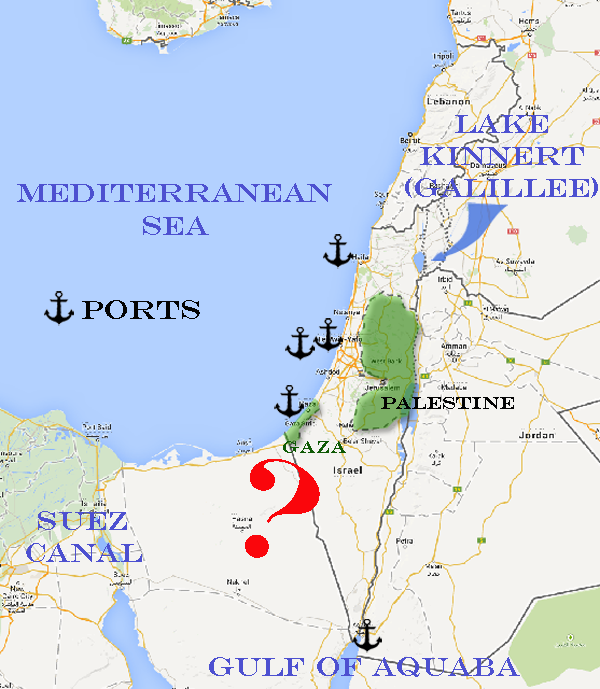 As I have written before, the Gaza war may also have been needed if the Palestinian Authority is to be able to negotiate peace and create a viable state.
As I have written before, the Gaza war may also have been needed if the Palestinian Authority is to be able to negotiate peace and create a viable state.
Even without Hamas, the Palestinian State is dubious as a thriving economy. Unlike Israel with it its seven thriving ports, Palestine on the West Bank has no access to the sea and almost no access to the water that comes from Lake Kinneret.
A peace treaty that provides access to the water is possible and even foretold by the treaties that have been negotiated already with Jordan. Hamas and Gaza are much bigger obstacles to peace.
HAMAS
Despite the fact that Hamas was legitimately elected to govern all of Palestine and the recent polling sh0wing that Hamas would win a popular election if one were held on the West Bank NOW, there is no imaginable way for Israel to negotiate its own destruction. This has been and still is Hamas’ irredentist condition for negotiation.
In a way, the problem got worse when Abbas overthrew Hamas and the radicals responded by seizing control of Gaza. They turned the rump district into a terror camp.
If Abbas succeeds, if Hamas is willing to pull in its extreme position enough to be part of a negotiation, Netanyahu should … if he really wants peace … respond by returning to a peace table.
GAZA Itself
Gaza is a problem even if Hamas is controlled. A putative Palestinian state on the West Bank is not economically viable. Even if Israel returned to the 1967 borders, the West Bank has almost no resources. With no access to the oceans, Palestine’s ability to trade what it does make would be very limited. Creating a tunnel from Gaza to the West Bank is an answer Israel has already offered but there is a better answer: Expand Gaza into the Sinai:
Now from Ze’ev Ben-Yechiel, Tazpit News Agency
Egyptian President Abdel Fattah al-Sisi has reportedly offered to give PA President Mahmoud Abbas part of the Sinai Peninsula adjacent to Gaza to establish a contiguous Palestinian state in those areas.
United States President Barack Obama and Israeli Prime Minister Benjamin Netanyahu were also notified of the plan, according to a report today (Monday, August 9) on Galei Tzahal (IDF Radio). Although there has been no official confirmation of the proposal, news of the initiative met with approval from Israeli leaders.
Abbas, meanwhile, is reported to have categorically rejected the plan, which entails a demilitarized PA state located on lands encompassing five times the current area of the Gaza Strip. The state, referred to as “Greater Gaza,” would contain PA citizens and Palestinian refugees living in other countries. The offer would also enable Arab cities in Judea and Samaria to retain PA autonomy, on condition that Abbas maintains a viable administration in those areas.
On the network’s “Good Morning Israel” radio program this morning, Science and Technology Minister Yaakov Peri expressed cautious enthusiasm for the plan. The cabinet member and former head of the Shin Bet security service was surprised by what he thought was a generous solution for peace between Israel and the Palestinians plan.
Sisi’s plan would require Abbas to give up his demand for a full return to pre-1967 borders, in exchange for a total land area in the Sinai greater than what the PA would have to relinquish in Judea and Samaria. Israeli experts have raised questions about why Abbas would reject the opportunity for an expanded bi-territorial PA-controlled Palestinian state, one that would allow him to retake a much larger Gaza from Hamas while still allowing for PA autonomy in its core jurisdictions.
Arab media outlets first reported the offer as coming from an unidentified senior Egyptian official, while the Egyptian Foreign Ministry denied that it came from Sisi, stating that it was proposed some time ago by deposed President Mohammed Morsi. A number of years ago Egypt rejected a similar plan by a group of Israeli academics led by Giora Eiland, former head of Israel’s National Security Council.
In response to today’s report, Minister of Knesset Ayelet Shaked (Jewish Home) supported the direction of the proposal, saying that “the solution to the Palestinian problem must be regional and cannot fall on Israel’s shoulders alone.”